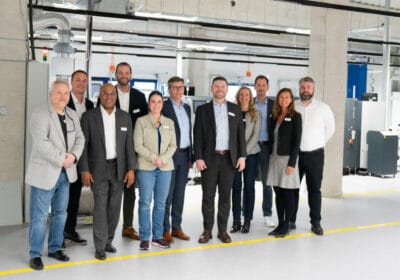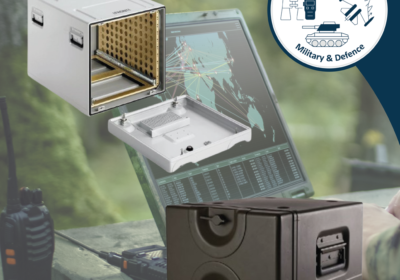Schwaig, 16 October 2019 – Scientific academics and a consortium of plastic processors and machinery manufacturers are joining together on a project to accelerate the development of autonomous machine learning. Details are being unveiled at K-2019, with Sumitomo (SHI) Demag providing the Industry 4.0-ready injection moulding machine.
As part of a pre-study launch project, Sumitomo (SHI) Demag Plastics Machinery in collaboration with the Institute for Plastics Processing (IKV) are showcasing the exciting AI and machine learning advances that are emerging, capturing valuable processing production data on a fully operational IntElect manufacturing cell.
With machine learning at the heart of future autonomous and intelligent systems, understanding the data independencies will be critical. Visitors to the IKV stand (Hall 14, Booth C16) will be able to visually see how self learning algorithms can be applied to different production sequences, how this impacts component quality and how this data can all be applied to support machine operatives during the set up of processing parameters. This pre-study project forms part of much larger academic project set to start in 2020 championed by a consortium of forward-thinking technology and engineering companies, including Sumitomo (SHI) Demag.
For the past year, engineers from Sumitomo (SHI) Demag have been heavily involved in designing the Industry 4.0-ready IntElect manufacturing cell, connecting the propriety moulding machine processing and quality data with digital data gathered on the physical component – including weight, temperature and part dimensions. Project lead from the Sumitomo (SHI) Demag team, Dr. Melanie Rohde-Tibitanzl, describes it as a ‘digital shadow’ that combines vast amounts of data from numerous sources, which in most instances would be beyond a human’s cognitive ability to draw parallels between.
Melanie clarifies: “The quality of injection moulded components and processing stability remain highly dependent on the knowledge and experience of a machine operator. However, there are complex interactions between part quality and machine process parameters, as well as other fluctuating and influential factors such as melt temperature, raw material batch fluctuations or inhomogeneous tool tempering, which aren’t captured and analysed through a single data source.”
As a result, deducing the correlation between machine settings and processing parameters and the final quality of the component is challenging. It also becomes inherently more complex the more target variables there are. “By removing the guesswork and trial and error adjustments, which itself takes a lot of skill, moulding plants will be more productive and operatives will be able to oversee a fleet of machines,” adds Dr. Thorsten Thümen. The respected engineering academic recently joined the company and is responsible for aligning Sumitomo (SHI) Demag’s application, plasticising technologies and Industry 4.0 technology-led developments.
To illustrate the possibilities of autonomous machine learning, members of the IKV scientific community are manufacturing a Raspberry Pi electronic housing on the IntElect cell at K-2019, recording and processing the entire data captured from the cell. Using their smart phones, visitors scan a QR code to instantly view the quality landscape in graph form, and experience the shift in component quality when the machine setting parameters change.
Commenting on the importance of collaborating with industry partners, Head of the IKV Professor Dr.-Ing. Christian Hopmann adds: “Since we first exhibited at K in 1952, ‘Research for Practical Use’ has been the IKV ethos. Demonstrating a production process that aims to shorten the set-up process through the use of artificial intelligence couldn’t be more pertinent. As we enter 2020, AI and machine learning will become ever more critical to digital manufacturing and production efficiency.”







